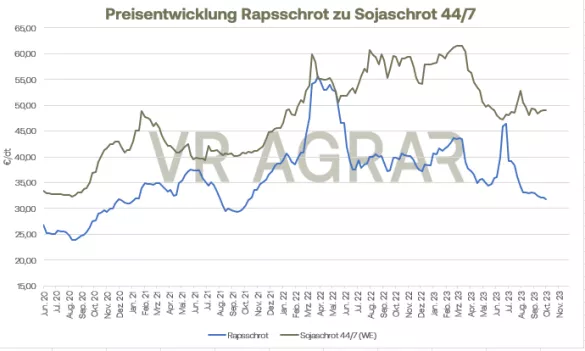Rapeseed appears to be significantly weaker on a weekly basis. Since the beginning of September, the front month has weakened significantly and this week the prices also glowed red several times. Particularly yesterday, Thursday, the contracts on the Paris stock exchange fell. Canola in Winnipeg continues to trend at multi-week lows. The harvest is mostly complete in Canada, and the availability of goods is generally decent and sufficient, just like in Europe. The reduced harvest expectations and the global rapeseed deficit that the IGC announced last week had little effect this week. Rather, the market is reacting positively to the agreement between Ukraine, Poland and Lithuania on agricultural goods transit and has a better view of the global supply situation. Additional pressure comes from the crude oil markets. These fell again over the course of the week due to weak labor market data in the USA and global economic concerns after the brief high, thus putting a strain on vegetable oils as a whole. Soybean oil also fell noticeably over the course of the week. Europe's rapeseed imports continue to develop below the previous year's volume levels; the most important supplier is still Ukraine, followed by Australia.The almost completed Canadian harvest does not yet play a role in the import statistics. As reported, demand for rapeseed meal is increasing again in this country. The product range remains manageable. At the wholesale level, however, the improved demand is not yet reflected in higher prices. From the biodiesel market, the Union for the Promotion of Plant and Protein Plants reports that overall trade volumes increased last year. In 2022, 2.7 million tons of biodiesel were exported from Germany, the most important buyer market being the Netherlands. But biodiesel imports to Germany also more than doubled to around 1.5 million tons between 2017 and 2022. Here too, the Netherlands was the most important trading partner for Germany. Soybean prices have also fallen this week. Soybean meal and soybean oil are also trending weaker than last Friday. The current harvest in the USA in particular is putting a strain on prices. In addition, there are always concerns about export demand. Brazil's industry association ANEC expects demand to continue to be significantly higher in October compared to October last year and is thus competing with the Americans, particularly in business with China.Even though the dollar has weakened somewhat overall in the last two days, it remains strong and is therefore partially limiting the USA's competitiveness. However, the export bookings published yesterday were solid overall and were at the upper end of the expectation scale. As with rapeseed, the development of crude oil prices also had a latent impact on prices. Soybean oil in particular has trended weaker in the last few trading days.

ZMP Live Expert Opinion
When it comes to soya, there is a classic harvest pressure that is strengthened or alleviated by accompanying news. Overall, however, oilseed prices are under pressure. The volatile environment for crude oil and the global economic outlook coupled with the war in Ukraine promise to continue to cause tension on the one hand, but overall the market is under pressure. Rapeseed and soy are currently sufficiently available.


